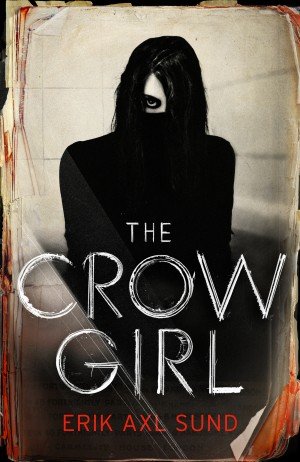
Translated by Neil Smith — It’s been a decade since the posthumous publication of Stieg Larsson’s The Girl With the Dragon Tattoo, which kicked off a global fascination in all things Nordic noir. Ever since, the holy grail for readers and publishers alike has been to find the next Stieg Larsson. The English-language debut of The Crow Girl, penned by a Swedish duo of rockers-turned-authors collectively known as Erik Axl Sund, feels like the next big thing in the sub-genre. Similar to the Millennium franchise, The Crow Girl was a trilogy published in Sweden, but for English readers the books have been combined into a single, hefty, 750-page volume.
The Crow Girl begins with the discovery of a young boy’s corpse, dumped by a Stockholm train station. Closer inspection reveals the body has been castrated, and mummified. If that wasn’t grim enough, forensics discover an anaesthetic in the young body, which is wracked with injuries, indicating the victim’s death may have been the result of a hideous phenomenon: human dog-fighting involving illegally trafficked children.
Detective Superintendent Jeanette Kihlberg, an overworked cop with a deep sense of justice is behind on her mortgage, burdened by her unemployed artist husband, and feels guilty about neglecting her teenage son’s emotional needs. Although she comes from two generations of cops, she still contends with a male-dominated workplace. While she tolerates her chief’s misogyny daily, she finds Prosecutor von Kwist downright obstructive. Von Kwist is particularly unhelpful in this case. After all, who’ll miss an unidentified immigrant boy?
With few clues to go on, Jeanette gets help from Sofia Zetterlund, a psychologist specialising in childhood abuse and trauma. Sofia moonlights as a psychological evaluator, recommending either psychiatric treatment or prison for offenders awaiting sentencing. Her latest subject, Karl Lundström, awaiting sentencing for sexually abusing his own daughter, has become a person of interest in Jeanette’s homicide case. Lundström has made public his views on castration, and is married to a dentist with access to anaesthetics. In his interview with Sofia, he lets on how easy it is to buy a child and implies that there is a far-reaching paedophile network with tendrils reaching right up into the government.
Sund gives flesh to an astonishing array of characters, inside and outside the police. The narrative shifts between Jeanette and Sofia, and we get right into their worlds. Jeanette is drawn immediately to Sofia, a kindred spirit who exudes mystery behind her professional exterior. However, the strongest character Sund introduces is Victoria Bergman, a patient of Sofia’s with a history of sexual abuse who is suffering from disassociative identity disorder and memory lapses as a result of trauma. And then there is the Crow Girl – an unidentified woman we see holding children captive via snapshots throughout the story.
The book is in three parts, and a stunning revelation in book one warns that nothing is what it seems, but everything is important and connected. In a master stroke, Sund’s standard police procedural setup transforms into a Hitchcockian fever dream as Victoria’s psyche explodes through the hypnotic audiotapes of interviews conducted by Sofia. As the doors of her memory open, her past begins to intersect with the present investigation. It grows harder to separate fantasy from fact.
As Jeanette is called to investigate the murder of Samuel Bai, she learns he is a former child soldier from Sierra Leone and also a patient of Sofia Zetterlund. Sofia meanwhile is sorting out what is real in Victoria’s ramblings. The unraveling of Victoria’s multiple personalities becomes increasingly relevant to the series of murders which follow.
In part three Sund ramps up the thrills and the creepy factor, and throws some outrageous aspects into the mix, including a barbaric religious cult, cannibalism and the Holocaust. While all of this sounds over the top, The Crow Girl doesn’t read like exploitation. It is notably thoughtful in its treatment of the issues of mental illness and child abuse. In the tradition of Nordic noir, there is fairly trenchant criticism of the welfare state, particularly with regard to the have-nots who fall through cracks of the social services. Alert readers will note that Sund even embeds a narrative nod to patron saints of the genre in Sweden, Maj Sjöwall and Per Wahlöö and Stieg Larsson.
The Crow Girl is a pulse-pounding thriller that manages to linger on character depth and puts an emphasis on supporting characters that are usually given short shrift. With its heady mix of graphic violence, noirish thrills and social commentary, the book has all the hallmarks of Nordic noir and is a must-read for Scandinavian crime fiction enthusiasts. This is an ambitious book with a large cast and multiple perspectives and timelines. At times audacious and far-fetched, it is nevertheless entertaining, combining the thriller credentials of Jo Nesbo with the deep psychological turmoil of Karin Alvtegen. But don’t expect the laughs of Jussi Adler-Olsen’s Department Q series in these grim pages. Do expect a spark of optimism, as Sund presents victims pushed towards destruction who survive against all odds and manage to re-define themselves on their own terms.
The Crow Girl should herald a big upsurge for Nordic noir, it’s a huge book and a landmark achievement for its authors. It will definitely turn heads worldwide as a darkly delightful must-read.
The book goes on sale 14 April, and you can read our interview with the authors here.
Harvill Secker
Print/Kindle/iBook
£7.99
CFL Rating: 5 Stars